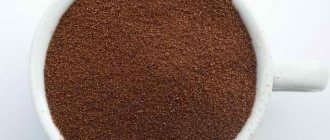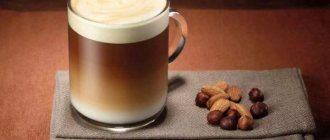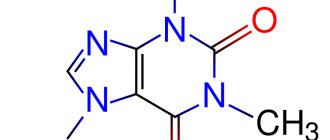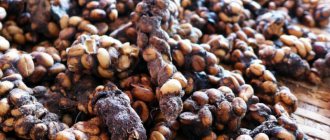Many coffee connoisseurs love this drink for its special, bitter taste, while others try to reduce the bitterness with milk and spices. It was previously believed that the bitter taste of coffee was caused by caffeine, but recent research has proven that this is not the case. German and American scientists have figured out why coffee is sometimes perceived as too bitter, what exactly affects the intensity of the taste, and how to reduce the bitterness of coffee if you don’t like it.
Why coffee tastes bitter: technical background
Coffee brewing is a science, and the main reason for the bitter taste may be extraction. Extraction is a method of extracting a substance from a dried consistency or solution using a solvent. It is thanks to him that clear water in a cup is transformed into a beautiful drink. When water is mixed with coffee base, a chemical reaction occurs that reveals the smell. The trick is to extract good flavor notes, not bitter ones, which can take a long time to develop.
Here are a few circumstances that could leave your drink with a nasty aftertaste. By paying attention to them, it will be easy to always drink only delicious coffee.
Experiment with water
98-99% of your cup is water, the rest is dissolved substances from the coffee beans. Therefore water is a very important factor. If the water is soft, the coffee will most likely be overbrewed; if it is hard, it will be underbrewed, so you need to look for the middle. This can be determined by the following signs: undercooked - very watery, without a clearly bright taste; overbrewed - very tart, can turn into bitterness. Good water is water of medium hardness. Here I can recommend either using home reverse osmosis (purification system), or Lipetsk pump room and Volvic water (these are my personal favorites, you can experiment with other brands).
You haven't changed your coffee for a very long time
This is especially true for French presses. It is used in the following way: heat a glass test tube with hot water, pour medium-coarse coffee into it, add water, allow time to brew, and then lower the plunger, sifting out the coffee particles. When the grounds remain in the French press for a very long time, when filling the next cup, the drink will be more bitter. If the drinking process takes a long time, then pour it into a thermal carafe. This way it will retain its warmth and beautiful taste.
Dirty equipment
The condition of the utensils and other cooking utensils also affects the taste. The remaining grounds deposited on the walls of the cup add bitterness when the drink is re-brewed.
Taking into account these simple subtleties, you can enjoy delicious coffee once a day.
Should coffee be bitter?
Some recognize as coffee only that drink that contains a pronounced bitterness; they frown at even the remotest sourness and say with a dissatisfied expression: “Something is sour. Apparently 100 percent Arabica. What kind of Arabica espresso?”
Others, on the contrary, do not accept any bitterness, considering it a defect - a consequence of overcooking the grain or overextraction.
So should coffee be bitter? And to what extent? Sourness, no matter how those who love Robusta consistency may protest, is still a natural component of coffee, but bitterness, what is its origin?
Bitterness is an attribute of any coffee, to some extent, along with acidity, sweetness, bitterness and other aromatic compounds. And its origin is different. This includes the bitterness of alkaloids (substances that influence the bitterness of plants), the bitterness from the Browning reaction during the caramelization process (the reaction between reducing sugars and amino acids), and the bitterness of other compounds such as quinic acid.
Alkaloids are bitter substances found in plants. They can be slightly poisonous, sometimes have a medicinal effect, and they taste bitter. Theobromine, found in chocolate, is an example of an alkaloid. Coffee contains slightly bitter caffeine and rather bitter trigonelline.
Caramelization. During this process, sugar acquires a bitter taste, often quite pleasant. Imagine the pleasant bitterness of dark caramel.
In addition, there are a huge number of bitter compounds in the world, one of which – quinic acid – is tart and bitter at once.
So: coffee contains all of these bitter compounds and many more. So bitterness is certainly part of the complex taste of coffee. But it shouldn't be dominant. When people say that “this coffee is not bitter,” they most likely mean that the bitterness is balanced by other components—sweetness, acidity, aroma, even perhaps saltiness. Remember that products such as chocolate and caramel also have an inherent bitterness as a component. In other words, the charcoal bitterness of over-roasted grain or the chemical bitterness of overextraction is one thing, and completely different, for example, rowan or caramel bitterness. The art of roasting and making coffee lies in preventing unpleasant bitterness from entering the taste, while leaving a pleasant bitterness that creates balance.
Why does coffee seem bitter?
Many consumers cannot imagine coffee without a specific bitterness, which provides the drink with unique taste characteristics, balancing other notes and smells of the drink, harmoniously complementing them. When describing coffee bitterness, connoisseurs use the epithets “exquisite”, “unique”, “fine” and others.
Bitter taste is a common attribute of natural coffee. Depending on a number of reasons, the strength of bitterness can be either pronounced, or moderate, or only slightly perceptible.
Scientists usually mention 3 main factors that form bitterness in a drink and influence its intensity:
- Variety Coffee blends in which Robusta predominates have a more pronounced bitter taste. Arabica in its pure form and as a base for blends, on the contrary, is virtually devoid of this coffee feature;
- Roasting. The bitterness of coffee beans directly depends on the degree of their roasting: the stronger the heat treatment, the more bitter the coffee;
- Manufacturing method. For some drinks, a bitter taste is considered a common and even unavoidable attribute. Traditional espresso, for example, is characterized by a pronounced coffee bitterness.
Where does the bitterness come from?
Research has even been conducted to find the source of specific coffee bitterness. Thus, scientists from the USA and Germany have refuted the common misconception that caffeine creates a bitter taste. They concluded that the amount of caffeine in the bitter taste is less than 15%. You can verify this using the usual method: just compare the taste of coffee with caffeine and without caffeine (the intensity of bitterness is actually similar). This statement is also supported by the fact that instant coffee containing caffeine is not bitter at all.
The intensity of roasting was recognized as a result of research work as the main reason influencing the presence and intensity of the bitter taste of coffee. The process of heat treatment of grains triggers chemical transformation inside the grains. The time and intensity of processing affects the content of bitter compounds and, accordingly, the bitterness of the drink. Among the substances that can stimulate the bitter taste of coffee, scientists have identified two classes: phenylindanes and chlorogenic acid lactones. Both are antioxidants and are formed during heat treatment.
About bitter taste receptors
Remember the map of the tongue's taste zones? Allegedly, it is the root of the tongue that is responsible for the perception of bitter taste, and the tip of the tongue for sweet taste. This myth was born in the 70s of the 20th century due to an incorrect translation of German work into English.
Research by scientists of this century has proven that the perception of taste occurs not only in the entire oral cavity; taste buds are located literally throughout our body - in the intestines, brain and even in the lungs. For example, bitter taste receptors located in the intestines are capable of activating protective reactions when toxins enter. Bitter receptors in the sinuses and lining of the bronchial passages alert the immune system to the bitter taste of chemicals that some bacteria use to communicate with each other.
Interestingly, for the perception of pleasant tastes - sweet and umami - we have one type of receptor for each. And we sense bitter taste through a whole group of receptors, scientifically called T2R. Each representative of this group, and there are at least 25 of them, deals with its own set of bitter substances. As the author of the book “Taste” writes, various bitter taste receptors have appeared and disappeared during the course of evolution. Our taste cells are now capable of recognizing more than 104 bitter substances.
The most interesting thing in the context of coffee: scientists still do not know what signals go to the brain from the different T2R receptors responsible for the perception of bitterness. It is difficult to compare the perception of hop bitterness by the T2R1 receptor and the bitterness of caffeine by the T2R7 receptor - the entire flavor profile of the drinks is affected.
Researchers believe that a person recognizes different bitter tastes, but what exactly bitter tastes exist is not yet answered in scientific circles. University of Pennsylvania scientist John Hise noted that different substances taste bitter in different ways. For example, he loves the bitterness of India pale ale, but hates the bitterness of grapefruit. Research on this matter is ongoing.
It's important to mention that the base flavors interact with each other. For example, salt suppresses the perception of bitterness. Scott Rao, a well-known professional in the coffee world, even had a post on Instagram: how to get rid of excess bitterness in a cup of coffee - just add salt. Its formula for too bitter espresso or filter: 0.15 g of salt per 100 g of coffee.
An impartial and personal perception of coffee bitterness
The intensity of bitterness in the drink, not counting the rest, may also depend on the recipe. The more coffee you use to make one serving, the more pronounced and, accordingly, bitter the taste will be. Many coffee lovers prefer this particular, bitter and rich taste of the drink. Essentially, there is no one standard for how bitter coffee should be. The norm in each specific case should be determined by personal preferences, cultural characteristics, and even well-being or mood. It is well known that taste perception and gastronomic preferences can change over the years, also under the influence of certain other reasons.
Indescribable, but true: the taste of coffee and the strength of the perceived bitterness depend not only on the parameters of the ingredients, but also on the color of the cup in which it is served. Australian scientists conducted a study, which ultimately proved that coffee in a blue or transparent mug is perceived as less bitter than a drink in snow-white dishes. Researchers explain this fact by saying that coffee in a snow-white cup is perceived as browner and, accordingly, more bitter.
How to deal with bitterness?
There is an effective method to reduce the intensity of bitterness in a finished drink. To do this, you need to pour a pinch of salt into a cup: sodium ions eliminate the bitter taste. This property of salt is understandable in almost all countries where drinking coffee with salt is a tradition (Turkey, Hungary, Norway).
The proportions of water and coffee, temperature and time of production, preparatory preparation of dishes and many other reasons can significantly influence the taste of the drink. Constant experience and skill acquired over time allow us to find an impeccable recipe for making it, in which the bitter aftertaste and other flavor and aromatic notes of coffee will be perfectly combined in one cup.
Reasons why coffee may taste bitter and how to remove the bitterness.
Many coffee lovers appreciate their favorite drink for its bitter taste. There are also those who do everything possible to remove this taste color. It was previously believed that the more caffeine, the stronger the bitterness. Scientists were able to prove that there is no connection here. Still, it’s worth understanding why coffee from a coffee machine or Turkish coffee tastes bitter and what affects the intensity of the taste.
Why is coffee bitter?
Greenish Arabica and Robusta beans do not have a bitter taste. It begins to appear during roasting. The prerequisite for such configurations are derivatives of chlorogenic acid. They are formed during heat treatment. Initially, the release of lactones is noted. Then they decompose into phenylindanes. The bitterness of the product depends on the concentration of these parts. The volume depends on a number of reasons:
- variety. It has been noted that robusta has a more bitter taste. Arabica has a sour flavor. Accordingly, if ground robusta is used during the manufacturing process, the drink will be more bitter;
- degree of roasting. The longer the grains are heat treated, more parts are released. Fans of a bitter drink should give preference to dark beans that have been heavily roasted;
- manufacturing development. It is noted that at high temperatures and pressures even more substances are released. That’s why ready-made espresso always has a bitterness. This note is considered one of the main notes of the popular drink.
Separately, it is worth highlighting another influencing factor - the choice of grinding degree. If during production in a Turk you need beans crushed into powder, then this option will not be suitable for a coffee machine. Extremely long extraction will result in a distinctly bitter taste.
The most bitter coffee
Bitter Arabica coffee is quite difficult to make. This variety is characterized by a milder taste. Still, bitter notes are pronounced in Arabica Honduras and Arabica Ethiopia Mocha. To give it the desired flavor, ground pepper is often added to it.
The most bitter coffee is Liberica. It is classified as a technical grade that is added to other coffee mixtures. This is justified by excess strength and bitterness. In second place is Robusta. Accordingly, the desired effect can be achieved by acquiring consistencies with a high concentration of this type of fruit. In all this, the brand is not particularly important.
The main thing is to look at the composition. The package should contain a maximum of Robusta and a small amount of Liberica. Arabica should not predominate.
Greeted by clothes
Coffee packaging is an important indicator of its quality, since coffee taste and aroma have two main enemies - light and oxygen, which mercilessly destroy all the most valuable properties of coffee beans. True coffee connoisseurs never buy coffee by weight in regular stores, because over weeks and months of storage on the counter, such coffee becomes sluggish and lifeless, loses its unique aroma and loses in taste characteristics. If you want to see the product in person, buy coffee in specialized departments that sell only fresh coffee beans. The packaging must be airtight - preferably made of three-layer foil with a valve, which is necessary not only to evaluate the aroma, but also to allow the release of carbon dioxide released during frying of the beans. At the same time, the valve is designed in such a cunning way that air easily comes out of it, but does not enter inside - removing excess carbon dioxide and preventing oxygen from entering allows you to preserve the original taste of coffee, which so attracts coffee gourmets.
How to reduce bitterness
Even though a unique, generous bitterness is a distinctive feature of certain types, for many, the fact that espresso, Americano or cappuccino is bitter becomes a real problem. The first thing we can recommend is to opt not for Robusta, but for Arabica. These grains are characterized by a softer, sour taste. If the product has already been purchased, you can use the following tips:
- salt. When making the drink, it makes sense to mix ground coffee with a small amount of salt (at the tip of a knife). You can also add it specifically to the cup. This product contains sodium ions, which reduce bitterness. With all this, the salt is not felt in the cup, but the taste changes significantly;
- cream or milk. Milk products can easily be removed from unpleasant tastes. In addition, they give the drink extraordinary tenderness and lightness;
- production at low temperatures. You can brew coffee in a Turk or any other low-temperature method. Salt will help remove bitterness in a coffee machine. Without adding it, it is problematic to achieve the desired result;
- cup color. It’s worth trying to pour an invigorating drink into a blue, black or brown container. It has been confirmed that people often feel a bitter taste when drinking coffee from a snow-white cup. Most likely, this happens due to the contrast of colors. The liquid appears darker and therefore stronger. Because of this, the taste properties are slightly distorted.
Ground or whole coffee beans
Since coffee begins to lose flavor immediately after grinding, it is best to buy whole coffee beans and grind them yourself before preparing the drink - at least that's what picky coffee lovers do. If you prefer ground coffee, pay attention to the degree of grinding:
- Coarse grinding (the cheapest) lasts no more than 10 seconds, is suitable for a piston coffee maker, and infuses for up to 7 minutes.
- Medium grinding lasts up to 14 seconds, is suitable for any coffee maker and Turk, and infuses for up to 5 minutes.
- Fine grinding lasts 20 seconds, intended for filter coffee makers, infuses for up to 3 minutes
- Fine Espresso – This grind produces a coffee “flour” that is ideal for espresso makers and Turkish Turkish coffee.
Unscrupulous manufacturers often dilute ground coffee with various mixtures that are easily detected at home - if you throw a pinch of coffee into a glass container with cold water and it turns brown, you have a fake that has nothing in common with real coffee.
Why is coffee from a coffee machine bitter?
If the cappuccino in a geyser coffee maker is bitter, the reason most likely lies in the incorrect grinding degree. This factor also affects the taste of the espresso prepared in the coffee machine. Usually, if the automatic device is configured correctly, the problem is immediately eliminated. After all, the taste and richness of the drink depends on this aspect. It is noted that the smaller the grind, the more bitterness. This is justified by the fact that small fractions have a larger surface area than large ones. Accordingly, they give away the greatest amount of substances contained in them. You just need to adjust the options. The degree of grinding should not be small.
It is also possible that the variety was selected incorrectly. Perhaps the grains initially have an extremely pronounced smell and taste.
The reason why espresso in a coffee machine comes out bitter is due to extremely long extraction. The following reasons can provoke this:
- more than eight grams of ground grains are consumed per serving;
- the degree of grinding of the product is extremely small;
- significantly powerful compaction;
- water heats up to more than 92 degrees;
- pressure exceeds 9 atmospheres.
To resolve the problem, check the following:
- at what temperature is the product stored;
- how finely the grains are ground;
- whether the knives in the coffee grinder are dull;
- the amount of product used per cup of espresso;
- pressure level;
- whether the cone or sieve in it is clogged;
- to what temperature does the water warm up?
Usually, with all this, the problem can be found and corrected without the help of others. If this does not work, you should contact a service center for help. It is possible that the coffee machine itself is faulty.
Not many people like the bitter taste of the coffee drink. If desired, it can be removed by resorting to some easy tricks. It is also worth taking seriously the choice of variety and manufacturing technology. In almost everything, taste properties depend on these criteria. For lovers of this bitterness there is also a solution. Certain varieties of fruits are characterized by pronounced bitter notes. In addition, it is much more noticeable in very roasted grains. They should be given preference in order to achieve the desired result.
Why is coffee bitter?
Many coffee connoisseurs adore this drink for its special, bitter taste, while others try to reduce the bitterness with milk and spices. It was previously believed that the bitter taste of coffee was caused by caffeine, but recent research has shown that this is not the case. German and South American scientists have figured out why coffee is sometimes perceived as too bitter, what specifically affects the intensity of the taste, and how to reduce the bitterness of coffee if you don’t like it.
Why is coffee bitter?
Greenish coffee beans have practically no bitter taste; it manifests itself exclusively during the roasting process. And the reason for it is not caffeine (it makes up only 12-15% of bitterness), but special substances, derivatives of chlorogenic acid, which are formed in the grain when heated: first, lactones are released, then they break down into phenylindanes. As studies have shown, the degree of bitterness of fried grains depends specifically on the number of these parts. But their volume depends on several reasons.
- Type of coffee. Typically, Robusta is more bitter, while Arabica is more sour. Robusta beans initially contain more caffeine and bittering substances, so the bitterness of the drink will be more pronounced.
- Roasting. The longer the grains are roasted, the more different parts appear in them. If you like bitterness, choose deep roasting and black beans.
- Manufacturing method. The higher the temperature and pressure, the more substances will be released. This is why espresso is always bitter, and this note is one of the important components of the taste of the right drink.
Interestingly, chlorogenic acid itself does not have a bitter taste, but its derivatives are what mainly form it.
Why is instant coffee not bitter?
All types of instant coffee are generally not bitter, and this does not depend on the production method. During the process of brewing the extract under enormous pressure, bitter substances are released and disintegrate, and that is why instant coffee is 40-50% less bitter than natural coffee. In general, if you would like to drink less bitter coffee, it is better to experiment with varieties and additives rather than harm your body with instant coffee.
Why is decaffeinated coffee bitter?
As mentioned above, caffeine contributes less than 12-15% bitterness to the taste (depending on the variety and roast). Everything else is a matter of chlorogenic acid derivatives. And that’s why good decaf coffee does not differ in taste from natural coffee: the bitterness and sourness are the same as in ordinary coffee. The colors of the taste can only be distinguished by professional tasters.
Natural or flavored
Coffee counters offer a large selection of flavored coffees with hints of vanilla, Irish whiskey, orange, amaretto and chocolate, but keep in mind that these are chemical, not natural, additives. If you want to enjoy the real taste of coffee without any extraneous notes, buy beans without additional aromatic “decor”.
Winston Churchill said that coffee is a very personal drink, so, like good cognac, it should not be drunk in huge mugs. And John Galsworthy believed that there were things to which one could not be faithful - for example, coffee. However, if you belong to the category of gourmets who change coffee like gloves, treat each variety personally and do not neglect the quality - in this case, unearthly pleasure is guaranteed!
How to reduce the bitterness of coffee
Despite the fact that a generous, unique bitterness is a distinctive feature of certain types, there are people who prefer the least bitter coffee. Firstly, you can choose not robusta, but Arabica, preferably high-altitude ones (there is more acid and a minimum of bitterness), or use blends of Arabica with Robusta, and secondly, if you have already purchased coffee, its taste can be adjusted:
- Add salt at the tip of a knife, to the ground coffee, or directly into the cup. There are sodium ions that compensate for the bitterness, reducing it. Just a small amount is enough, you won’t feel the salt in the cup, but the taste will change. Coffee with salt is worth trying.
- Add milk or cream. Milk products perfectly remove the bitter taste of the drink.
- Brew coffee in a Turkish coffee pot or brew it using another method, at low temperature and with the lid open. In a coffee machine, everything is the opposite, and that’s why the espresso comes out so bitter. Again, you can add a little salt to coffee from a coffee machine.
- Try pouring coffee into a blue, brown or black cup. Inexplicably, scientists have tested: many people actually consider coffee to be more bitter if it is poured into snow-white dishes. Maybe because of the contrast of colors it seems darker, which means stronger, and is perceived as more bitter.
- Coffee is bitter not because of caffeine, but because of chlorogenic acid derivatives that are released when the beans are roasted.
- The darker the roast, the more bitter the coffee will taste.
- Robusta is more bitter than Arabica.
- Instant coffee is not bitter because the substances that impart bitterness are boiled out of it.
- Decaffeinated coffee is almost the same bitter as regular coffee, the difference in taste is imperceptible.
- To reduce the bitterness, you can add a little salt to the drink, cook it in a pot over low heat, or try pouring it into a black cup.
Is the best coffee expensive? What brand?
Experts say no. We found out that the retail price of good coffee starts somewhere around $10 per kilogram. It cannot be said that a person who is presented with two cups of coffee, one of which contains the most expensive Blue Mountain variety, selling from $100 per kilogram, and the other - Brazilian Arabica at $5 per kilogram, will prefer the coffee from the first cup.
- Coffee under the Jockey brand. Good Dutch technology. This coffee is distinguished among budget brands by the identity of the blend and excellent flavor tones.
- Inexpensive but high-quality ones include all brands and Jacobs. Paulig brand espresso is so popular that it even began to be sold at McDonald's, because it was made and “customized” for Russia.
- Coffee from Ethiopia, sold under one of its own brands in the Auchan retail chain.
- Lavazza coffee - this brand of coffee is too overrated in Russia. In Europe it sells for 2 euros per pack, but in our country many consider it premium.
- Experts rate Blue Mountain as a very good and tasty variety. Its price depends on the fact that it is harvested very little - only 900 tons per year worldwide, and Arabica production amounts to millions of tons.
- Expensive Kopi Luwak variety. Its price - about $200 per kilogram - is due to the fact that the cute little animals of the musanga simply cannot produce more. They pass the coffee beans through their intestines and thus promote the fermentation of the coffee. The result is a dense, rich, soft variety.










